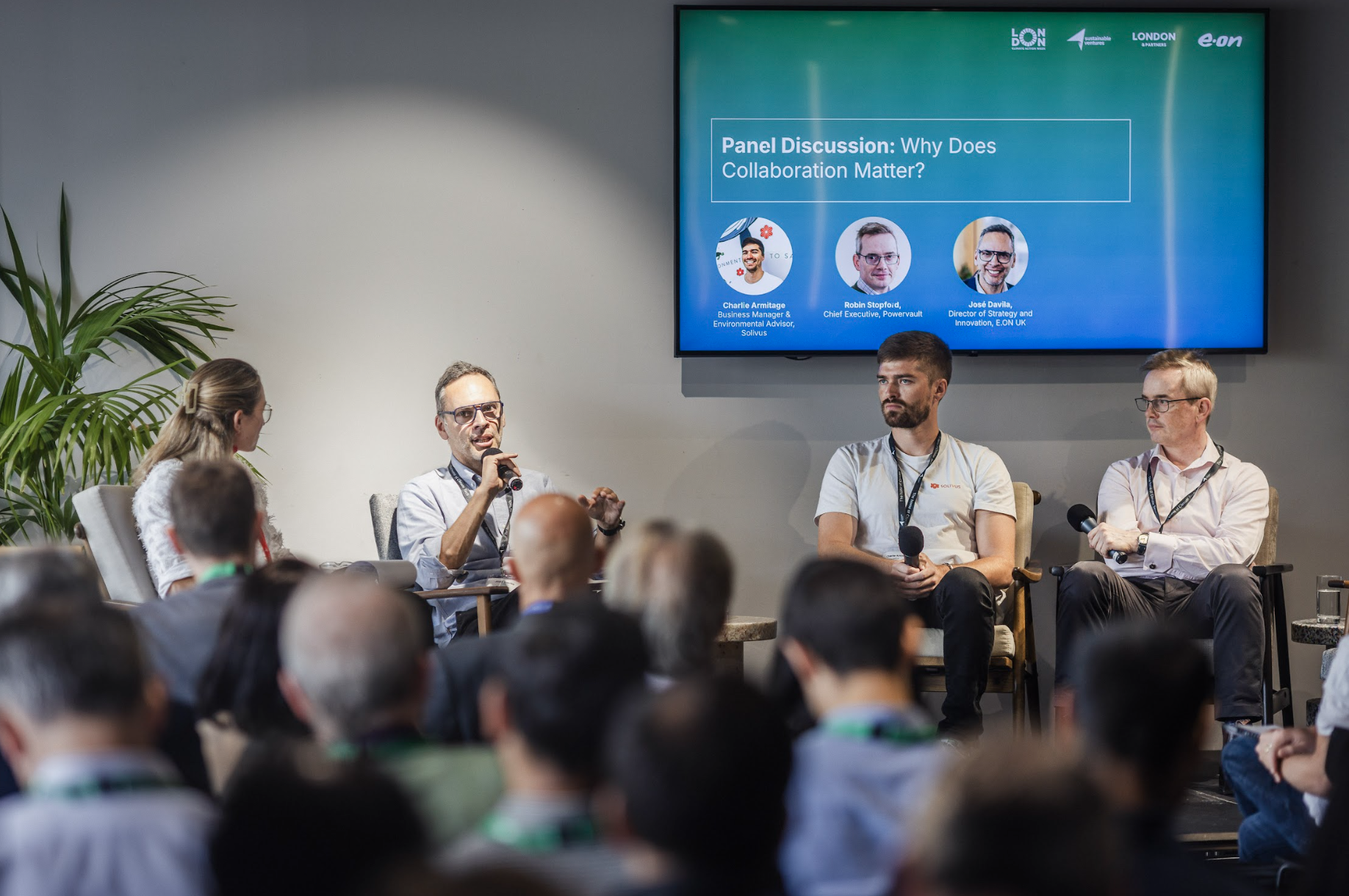10 Takeaways from London Climate Action Week at Sustainable Ventures
This year’s London Climate Action Week was the biggest yet, hosting over 700 events. At Sustainable Ventures’ London HQ in the iconic County Hall building, it's fair to say that we rose to the occasion. Dubbed “the epicentre of the climate economy" by Howard Dawber, London’s Deputy Mayor for Business, our space was alive with energy, ideas, and collaboration bringing together businesses, policy makers and investors from across the Capital. With the generous support of our lead sponsor E.ON UK, strategic sponsor London & Partners, and event sponsors OakNorth and Potter Clarkson, we hosted 26 events, welcomed 89 inspiring speakers, and connected over 2,600 individuals to foster connections and drive forward genuine, inclusive action.
Themes across the week ranged from AI’s transformative potential to the importance of public-private partnerships that have the power to decarbonise our city - topics that are part of our day-to-day here at SV. The beauty of LCAW is that we were able to dive into these conversations with a live audience, sharing insights, solutions from within our ecosystem and importantly, the optimism that continues to drive our mission to build the world’s most impactful climate tech ecosystem.
As we reflect on the week, we thought we’d share a breakdown of some of the key takeaways that emerged from our five flagship events.
Howard Dawber, Deputy Mayor for Business, speaking at SV’s stakeholder dinner on Tuesday
Monday’s opening session “Beyond the Hype: How AI Can Actually Accelerate Climate Tech” explored the intersection of AI and climate innovation, highlighting both its transformative potential and the challenges of implementation. The panelists shared real-world applications of AI, from renewable energy forecasting to neuromorphic chips that emulate the human brain. Alex Cohen, Climate Tech Lead at Google Cloud, gave examples from several of their flagship projects, including Firesat, which uses compact satellites and AI to predict wildfires; AI-driven weather forecasting to reduce flight emissions and optimised traffic light sequencing to cut idling.
Speakers included Alex Cohen, Climate Tech Lead at Google Cloud, Dr. Giulia Marcucci, Founder at LumiAIres, Dan Travers, Co-Founder at Open Climate Fix and Oxana Loguinova from OliveGaea.
Key Takeaways:
1. The majority of people in the room thought AI was more likely to be the solution than the problem when it comes to climate change. In reality, AI currently uses as much power annually as Japan. Yet, it’s predicted that AI could help mitigate 10% of global greenhouse gas emissions by 2030. 🤖
2. Innovations like neuromorphic chips - designed to emulate the efficiency of the human brain can also dramatically reduce this footprint. Giulia’s team has demonstrated that neuromorphic chips can cut the energy consumption of AI models by up to 90%, a breakthrough with far-reaching implications for climate-focused applications! 📉
Tuesday’s “AI x Energy: Rewiring the System so that Clean Energy Works for Everyone” covered the opportunity for AI to transform the energy system, making it more efficient, equitable, and inclusive. From smart homes to grid-scale coordination, the discussion emphasised the need for systemic change, starting from the inside - with real-world case studies from SV members Kuppa and Powervault.
Thanks to our speakers José Davila, Director of Strategy & Innovation, E.ON UK, Allegra Reister, Innovations & Partnerships, Google, Kirsty Kenney, Co-Founder, Kuppa, Robin Stopford, Chief Executive, Powervault.
Key Takeaways:
3. José Davila highlighted that E.ON are seeing that customers want agency in automation until they trust the system enough to hand over control. This is a real opportunity to redesign the system from the ground up for the customer. 💭
4. Allegra Reister from Google reflected on the need for startups to define clear value propositions with this in mind, whilst sharing examples of Google projects such as using AI forecasting to drive efficiency and affordability for a more resilient grid. 💡
José Davila, Director of Strategy & Innovation at E.ON UK shares his thoughts on the importance of collaboration within the industry
Wednesday’s “System Shift: Value Chain Collaboration to Decarbonise the Built Environment” brought together John MacPherson, Digital Director Scotland, Amey, Sean Lockie, Climate Leader, ARUP and Joe McMullen, COO, AirEx Technologies to talk about how startups and established players can work together to decarbonise the built environment across the value chain, from design to maintenance.
Key Takeaways:
We need to move the focus away from decarbonising individual buildings - and think about solutions and collaborations that can transform the entire system. 🔁
Climate change is not going to be solved by SaaS and software alone, we need investment into physical infrastructure like smart HVAC systems and energy-efficient materials. 🏢
Thursday was brimming with ideas, as we hosted our ‘Decarbonising London and Unlocking Green Growth for Net Zero by 2030’ in partnership with Centre for London.
Speakers included Howard Dawber OBE, Dr. Afsheen Kabir Rashid MBE, Pru Ashby, London & Partners and Antonia Jennings, Centre for London, with the event highlighting the economic potential of the green sector, which this year surpassed £50 billion. The panel discussed how public-private collaboration, alongside innovation, is imperative in London achieving its ambitious net-zero goals.
Key Takeaways:
London is one of the world’s leading climate tech hubs. This year it has become the leading centre for VC fundraising globally, surpassing the Bay Area. This positions the city as a key player in driving green growth. 📈
With 5 years to achieving London’s ambitious net zero goals, collaboration between the public and private sector is a key focus, investing in solutions & projects that can genuinely move the needle. 🤝
Our final event of the week, titled ‘Under the Lid of Our Food System: What It Takes to Enable Innovation’ tackled the inefficiencies in the food system, showcasing how innovative projects like our “AI food redistribution” project can make a real impact.
The panel was made up of Dini McGrath, Co-Founder, Zest, Noamaan Siddiqi, CEO, Bristol Superlight and Josh Wheeler, Senior Programme Manager, FareShare, chaired by our Corporate Innovation Director, Emily Barrett.
Key Takeaways:
The scale of the food waste problem: Approximately 10.7 million tonnes of food are wasted annually in the UK, with 6.4 million tonnes still edible. Addressing this issue is both an economic and environmental imperative.🥫
Building visibility and trust in food supply chains is essential to reducing waste. Startups like Zest are leveraging AI to create smarter, more efficient systems. 👁️🗨️
The panel at our “Under the Lid of Our Food System” event on Thursday
London Climate Action Week at Sustainable Ventures was a powerful reminder of what’s possible when innovators, policymakers, and businesses come together. Here at Sustainable Ventures, it's not just about one week of climate action - it’s a year-round commitment.





